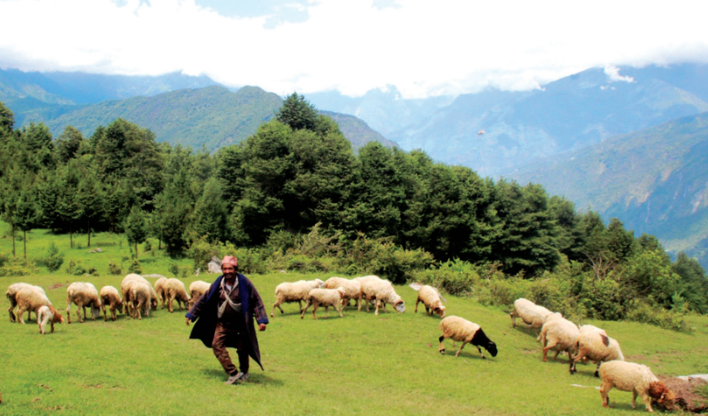Govt forms five-member panel to investigate Yeti Airlines plane crash
The government has formed a five-member probe committee to investigate Yeti Airlines plane crash. An emergency Cabinet meeting held at the Prime Minister’s official residence in Baluwatar on Sunday following the plane crash made the decision to this effect. Emerging from the meeting, Deputy Prime Minister and Finance Minister Bishnu Poudel said that the five-member probe committee has been formed to investigate the incident. The reason behind the incident, however, is not immediately known. A Yeti Airlines plane carrying 68 passengers crashed in Pokhara on Sunday. The plane with call sign ATR-72 took off from Kathmandu to Pokhara at 10: 33 am today, police said. According to Sudarshan Bartaula, spokesperson of the Yeti Airlines, there were two pilots, two air hostesses and 68 passengers on board the ill-fated aircraft that crashed between the old airport and the Pokhara International Airport this morning.
Yeti Airlines plane carrying 68 passengers crashes in Pokhara
A Yeti Airlines plane carrying 68 passengers crashed in Pokhara on Sunday.
The plane with call sign ATR-72 took off from Kathmandu to Pokhara at 10: 33 am today, police said.
According to Sudarshan Bartaula, spokesperson of the Yeti Airlines, there were two pilots, two air hostesses and 68 passengers on board the ill-fated aircraft that crashed between the old airport and the Pokhara International Airport this morning.
 He said that there were 10 foreign passengers on the plane.
Chief District Officer of Kaski district Tek Bahadur Karki said that he has directed the health facilities to be on high alert.
More details about the incident are awaited.
He said that there were 10 foreign passengers on the plane.
Chief District Officer of Kaski district Tek Bahadur Karki said that he has directed the health facilities to be on high alert.
More details about the incident are awaited.

Dahal government faces global pressure to right war-era wrongs
With the formation of a new government under Pushpa Kamal Dahal, the international community has started showing concerns about conflict-era rights abuses. On Jan 12, Human Rights Watch, a rights body, came up with a statement urging the Dahal-led government to amend the transitional justice bill.
A new transitional justice bill, to address abuses committed during Nepal’s 1996-2006 civil war, was presented to the parliament in Aug 2022, HRW says, adding: The bill, despite significant flaws, had raised hope among the victims and their families, who have waited over 16 years for justice. The flaws include wording that makes it possible to grant amnesty for certain gross violations of human rights, crimes against humanity, and war crimes, the statement said.
In addition, verdicts from a new special court would not be subject to judicial appeal, in violation of international fair trial guarantees. The bill was neither amended nor brought to a vote before parliament was dissolved ahead of November elections, according to the statement.
Speaking with media persons on Jan 12, American Ambassador to Nepal Dean R Thompson said that the international community is keenly interested to see progress in transitional justice. “This is definitely something that I talk about with my colleagues in the international community. I hope we can see progress,” he had said: “Ruling parties in their Common Minimum Program have pledged to conclude the transitional justice process.”
Transitional justice mechanism—Truth and Reconciliation Commission and Commission of Investigation on Enforced Disappeared Persons—are without heads and other officer-bearers. The international community, however, has not cooperated with the commissions. The bottom-line of the international community is that there should be appointment in both commissions only after the amendment of laws in line with the Supreme Court verdict 2015, said former Chair of Truth and Reconciliation Commission.
OnePlus 10T arrives in the Nepali market
After the lifting of import restrictions, the Nepali gadget market is gradually seeing the launches of high-end mobile phones. After Apple launched the iPhone 14 series, the market is all set to get another flagship model from the OnePlus 10T. Launched in the global market last year, the OnePlus 10T could not be released in the Nepali market in 2022 due to import restrictions. Smart Talk Pvt Ltd, the national distributor of OnePlus in Nepal, is launching the 10T today. According to the distributor, OnePlus 10T is laden with various top-end specs including Snapdragon 8+ Gen 1 processor, a 50 MP triple camera, and a 4,800mAh battery. The phone inherits a unibody design similar to the OnePlus 10 Pro. The OnePlus 10T 5G resembles the OnePlus 10 Pro 5G in terms of camera arrangement, but there is a slight difference: the rear panel of the former bulges a little. The OnePlus 10T 5G has also ditched the alert slider. The OnePlus 10T 5G comes up with a large 6.7 inches Samsung E4 AMOLED display along with a screen resolution of 1080 x 2412 pixels. The smartphone has a 20:9 aspect ratio, 120Hz refresh rate, HDR10+, and 10-bit color depth. It is also packed with an under-display, optical fingerprint sensor and face unlock. The phone comes with a triple camera setup which is a combination of a 50MP (Sony IMX766) wide, ultrawide, and macro. The 10T cameras support 10-bit color capture, OnePlus’s Nightscape mode, and offer improved HDR performance. The phone has a 16 MP selfie camera on the front. When it comes to video recording, the rear camera records up to 4K@30fps, 1080p@30/60/120fps, and the front cameras record videos up to 1080p@30fps. The phone has OxygenOS 12.1 based on Android 12. The OnePlus 10T price in Nepal is Rs 94,999 for the 8/128GB variant and Rs 114,999 for the 16/256GB variant. The phone comes in two color options of Jade green and Moonstone Black. The handset is already available for pre-order at the e-commerce portal Daraz.




















